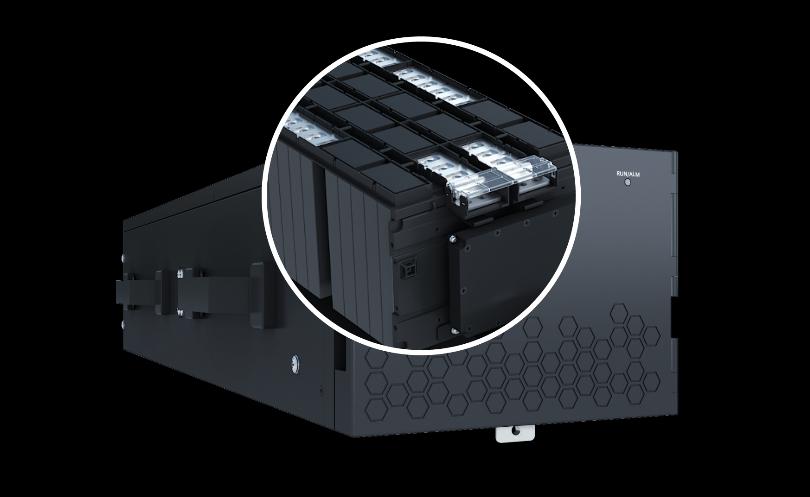Why Switch to Lithium Battery UPS for Your Backup Power?
Switching to a Lithium battery UPS for backup power is a strategic decision that offers numerous advantages over conventional systems. While traditional lead-acid batteries have been the go-to choice for years, advancements in technology have made lithium batteries a superior alternative. Safety, efficiency, and cost-effectiveness are just a few of the reasons why you should consider making the switch. This blog will explore the compelling advantages, cost savings, environmental benefits, and how to choose the right Lithium Battery UPS for your needs.
The Advantages of Lithium Battery UPS Over Traditional Systems
Longer Lifespan and Reliability
Lithium Battery UPS systems boast a significantly longer lifespan compared to their lead-acid counterparts. On average, they can last over ten years, which is about three times the lifespan of traditional batteries. This longevity ensures consistent, reliable backup power for extended periods, reducing the frequency of replacements and downtimes. The inherent reliability of lithium batteries also means fewer disruptions and more continuous protection for both residential and commercial setups.

Reduced Maintenance and Frequency of Replacements
One of the standout advantages of Lithium Battery UPS systems is their low maintenance requirements. Unlike lead-acid batteries that need regular maintenance and monitoring, lithium batteries are relatively maintenance-free. They are designed to prevent leakage and degradation, which translates into less frequent replacements and overall less hassle for the user. This also means that the total cost of ownership is significantly reduced. By choosing lithium batteries, you’re investing in a system that requires minimal attention and offers maximum reliability.
Cost Efficiency: How Lithium Battery UPS Saves You Money
Initial Investment vs. Long-Term Savings
Although the initial investment in a Lithium Battery UPS may be higher than traditional systems, the long-term savings are significant. Longer lifespan and reduced maintenance translate into lower replacement costs and less frequent servicing expenses. Over the lifetime of the battery system, the savings on maintenance alone can offset the initial higher cost. Additionally, lithium batteries offer better energy efficiency, reducing electricity bills and operational costs.
Case Studies Showing ROI of Lithium Battery UPS
Numerous case studies illustrate the return on investment (ROI) of switching to a Lithium Battery UPS. For instance, data centers that have transitioned to lithium batteries report savings of up to 40% on backup power costs. Telecommunications companies have noted substantial operational savings and increased reliability, which enhances service quality and customer satisfaction. These real-world examples demonstrate that the financial benefits of lithium batteries go beyond just theoretical savings, providing tangible economic advantages.
Environmental Impact: Why Lithium Battery UPS is More Sustainable
Reduced Carbon Footprint and Energy Consumption
Environmental sustainability is another compelling reason to switch to Lithium Battery UPS systems. These systems are more energy-efficient than lead-acid batteries, requiring less power to charge and maintain. This enhanced efficiency reduces your overall energy consumption and, as a result, your carbon footprint. The adoption of lithium batteries aligns with global efforts to reduce greenhouse gas emissions and promotes greener energy practices.
Recycling and Disposal Benefits Compared to Lead-Acid Batteries
Lithium batteries are also more environmentally friendly when it comes to recycling and disposal. Lead-acid batteries contain hazardous materials that can be harmful if not disposed of properly. In contrast, lithium batteries are built with fewer toxic materials, making them easier and safer to recycle. Recycling programs for lithium batteries are more widespread and better regulated, ensuring that end-of-life battery disposal has a minimal environmental impact. By opting for lithium, you contribute to a more sustainable recycling ecosystem.
Choosing the Right Lithium Battery UPS for Your Needs
Factors to Consider When Selecting a UPS
Choosing the right Lithium Battery UPS involves several critical factors. Assess your power requirements by examining your total load and runtime needs. Consider the physical space available for the UPS and ensure the system’s capacity aligns with your backup power demands. Additionally, evaluate the battery management system (BMS) integrated within the UPS. A good BMS optimizes performance and ensures the longevity of the battery.

Key Features to Look for in a Lithium Battery UPS
When selecting a Lithium Battery UPS, look for key features that align with your specific needs. Ensure the UPS has a high power density, allowing it to store more electricity in a smaller space. Fast charging capabilities are essential for minimizing downtime and ensuring continuous power availability. Advanced monitoring systems are also crucial; they allow you to track performance and predict potential issues before they become significant problems. Finally, check for comprehensive safety features, such as thermal management, overvoltage protection, and short-circuit prevention.
Conclusion
Switching to a Lithium Battery UPS offers numerous advantages, from long-term cost savings to significant environmental benefits. Their impressive lifespan, reduced maintenance needs, and incredible reliability make them a superior choice over traditional lead-acid batteries. Furthermore, the positive environmental impact and sustainable recycling processes add to the appeal. By considering the factors outlined in this guide, you can make an informed decision to invest in a Lithium Battery UPS that meets your backup power needs and supports a sustainable future.
